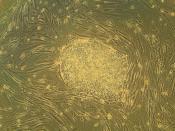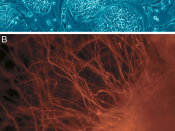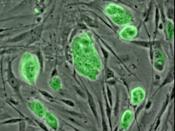Summary of the Information contained in the reference: Questions were raised on the validity of fundamental patents on human embryonic stem cells granted to University of Wisconsin scientist, James A. Thomson. The Foundation for taxpayer and consumer rights, and Public patent foundation claim that Mr. Thomson's work did not deserve a patent. The organizations claim that three scientific papers by other scientists, and a patent from the past laid the foundation to Mr. Thomson's success. Mr. Thomson was the first to isolate human embryonic stem cells. The organizations feel Mr. Thomson's success is due to research previously conducted on various animals. The patents will be re-examined and evaluated by The United States Patent and Trademark Office.
Student reflection/ response/ analysis Instead of celebrating the incredible medical advancement, negative publicity centers around stem cell research once again. This time it's not about the ethics or morals, but who did it first.
In my opinion Mr. Thomson's patent should not be re-examined. The patent that was granted to him was based upon human embryonic stem cells. The organizations arguing that previous stem research on animals laid the foundation for his success. For the most part, it probable did, but a human and an animal are different, and therefore the patents should be too. I feel the only reason these organizations requested for a re-examination is financially. The outcome of his research is going to be worth a lot of money. One would think with a medical breakthrough as big as this, an abundance of applause would follow, not lawsuits. The University of Wisconsin stated "the decision of the re-examination could lead to a narrowing or even a recession of the three patents"( The New York Times"). The cause and effect of that would be devastating. Further research would become less,


